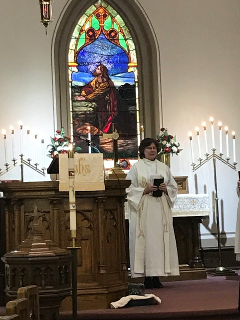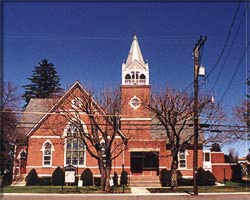Monthly Message
Read "From the Pastor's Desk," Pastor Michele Kaufman's monthly message:
From Pastor Michele Kaufman
April 2025
It is that season of the Church's year when we as Christians dwell on the Mystery of the Crucifixion. And what the Crucifixion tells us is this: God Himself died upon a cross, to pour out His love for us, to forgive us our sins, to share His life with us now, and eternally. Too many people move from Palm Sunday's jubilation to Easter's victory and never take the excruciating walk through the Upper Room, the Garden of Gethsemane, the Trials, and Mount Calvary. But you must go through it all really to know the joy of the open tomb! Let us examine what Our Lord went through even physically in His love for us: in His suffering, His Passion, and His crucifixion: in His agony in the Garden, in His scourging at the pillar, in His crowning with thorns, in His carrying the cross to Calvary, in His crucifixion and death. As we more deeply realize this, what God went through in His love for us, we will hopefully realize more deeply the love that God has for us, for you and for me. 4 Look at the cross. Empty and unoccupied, it is simply an object of brass or the timbers of a tree; but, when the crucified and suffering body of Jesus Christ is placed on the historic cross of Calvary, it becomes a sword - a sword in the hand of God that can conquer everything in heaven and on earth. It can even destroy the very gates of hell. Alleluia! Rejoice! Blessed is the King who comes in the name of the Lord!
March 2025
The 40 Days of Lent
“The flood continued forty days on the earth. The waters increased and bore up the ark” (Genesis 7:17). As the flood covered the earth and lifted up the ark, saving those within, so in baptism we die to sin and are raised to new life in Christ. Lent is a time to walk in newness of life.
“The Lord your God has led you these forty years in the wilderness, that he might humble you, testing you to know what was in your heart” (Deuteronomy 8:2) Lent is a season of humility and repentance, as we turn to the Lord and seek his forgiveness. Lent is a time to forgive others as we have been forgiven.
“He presented himself alive to them after his suffering by many proofs, appearing to them during forty days and speaking about the kingdom of God” (Acts 1:3) The risen Lord appeared repeatedly to his disciples and taught them about the kingdom, preparing them to be his witnesses. Lent is a time to be witnesses for Jesus, to tell others of the forgiveness and life found only in his name.
Lent is a season of forty days, from Ash Wednesday to Holy Saturday, the day before Easter. Because Sundays celebrate Jesus’ resurrection, they are not included in the forty days. In the Bible, the number forty appears in the story of the flood, in Israel’s wandering in the wilderness and in the life of Jesus. The number forty is often a symbol of ruin and renewal, testing and teaching.
Lent is a time for us to remember the ruin that sin brings to our lives, to repent and receive God’s forgiveness. After his baptism, Jesus “was in the wilderness forty days, being tempted by Satan” (Mark 1:13). During these forty days we remember how our Lord stood in the place of sinners, in our place, and resisted every temptation of the devil. On the cross, the innocent Son of God suffered the punishment we deserved for our sins.
February 2025
Arise, shine, for your light has come, and the glory of the Lord rises upon you. See, darkness covers the earth and thick darkness is over the peoples, but the Lord rises upon you and his glory appears over you . . .” Isaiah 60:1
We are now in the season of Epiphany. Epiphany begins with the wise men following a distant light and continues through the celebration of the Transfiguration--when we see Jesus in all his glory.
Epiphany is not only a season of the church year; it has also crept into secular usage. When we say that someone has had an epiphany, we usually mean that that person has had a moment in which they have achieved a realization, an awareness or a knowledge of something, after which events are thrown into a new light. Such epiphanies may be life-changing. The symbol of light is an appropriate one in this, the darkest season of the year. Light is a favorite symbol throughout the Scriptures. Christ said about our witness that we do not light a candle and put it under a bushel. Christ himself is seen as the light of the world. When Isaiah sought to proclaim the coming of the anointed one of God, he declared, “Arise shine your light is come (60:1). During this season we read stories of how Christ is revealed to the world. For those who experience his “presence”, they have that “ah ha” moment; that “there you are Jesus”.
Christ is our light and in him is no darkness at all. For just as light is the appropriate symbol for Christ, darkness is the appropriate symbol for a world without Christ. Professor Harold DeWolf, in his book The Religious Revolt Against Reason, tells of an experience he had as a young man. He went swimming at midnight one night with a friend in the Atlantic Ocean at Massachusetts Bay. He said the water was full of phosphorescent light. Every dip of his hand in the water produced something like “a circle of flashing gems and every breaker looked like a cascade of fireworks.” To ride the waves they went out some distance from the shore. Then turning toward land DeWolf was gripped by a strange fear. The lights from the shore no longer shone. So he looked up to the sky to get his bearings. But the sky was like the water--full of the spectacular confusion of the northern lights. “No star was visible. Then panic overtook him, for in all that glittering display there was no fixed reality. He could not tell the way to shore. He started back with a helpless terror engulfing him.” He learned that, with no fixed star to guide him, it was almost impossible to chart out his course. Thank God we have a star to follow. It is the same star that guided the magi long ago. It is the light of Christ. Christ is our dependable guide, whose love never fails.
January 2025:
In the comic strip, “Calvin and Hobbes” Calvin and Hobbes are talking about the New Year. Calvin says, “I’m getting disillusioned with these New Years. They don’t seem very new at all. Each New Year is just like the old year. Here another year has gone by and everything’s still the same. There’s still pollution and war and stupidity and greed. Things haven’t changed. I say what kind of future is this? I thought things were supposed to improve. I thought the future was supposed to be better.”
Hobbes replies with his usual keen insight, “The problem with the future is that it keeps turning into the present.”
The New Year is traditionally a time for reflection. We look back over the year and assess our successes and failures. We may feel a sense of accomplishment from our successes, and we may experience some grief and guilt over our failures. Each time we face a new beginning. We have hopes that things will be different and hopefully better. But as Hobbes says, the future just keeps turning into more of the present. I think we have good intentions of making the necessary changes; what we lack is the motivation, the resolute. The Bible talks about a God "who can make all things new." Paul declares in other portions of his writing that "if any person is in Christ Jesus, they are a new creation."
What we need is not inspiration, but a transformation. Not a resolution, but a revolution. We need a change in our lives that comes from God. What every person needs is something that will permanently affect their life situation. What we need is something that will truly satisfy our longings; something that will bring true and lasting change. What we need is for God to do a new thing within us. We can be new people when we have the mind and attitude of Jesus Christ living inside us. Christ’s spirit lives best in his disciples who say, "This I will do," rather than, "Something ought to be done around this place." The power that God offers us is a resource we need to draw on. We need to draw on our faith- it is the power that comes from believing all things are possible.
So I close with this prayer that appeared in the Upper Room publication by Rev. Dr. Kenneth G. Phifer, written with the intent of letting go of the past and relying more on our faith in the New Year
"Eternal God, before whom we are creatures of the day and children of the hours, I lift my prayers to you as I stand in the shadow of the waning year. I am aware once more of the fleetingness of time, and the transiency of my being. So much has happened to me during the year now so rapidly slipping away, So much of hurt and happiness, of loss and gain, of hope and fear. I did not expect the sorrow that was thrust upon me. I was surprised by the turn of events that changed my life. I look back. I remember how different life a year ago was, The slow, quiet erosion of the days has gone on, and I am not quite the same person I was, for better or for worse. I have had a whole year to grow in love or to fall out of love, to turn my hands to constructive tasks, or to turn away in idleness. I have had a whole year, and now it is almost gone. No matter what I have done or failed to do, O Lord, keep me from dwelling on it too much. If I have failed, help me put my failure behind me. If I have done well, help me to be glad but not complacent. There are other hills to climb and new hopes to be realized. I know, O God, you understand my need to look back for a while, wistfully peering at the past. But start me looking forward. I do not know what events are ahead, but I do know you are there, and I am grateful. Amen.
|


Cellphone: (570) 881-2371
Home Phone: (570) 443-0832
Office Phone: (570) 474-6616 (Saint Paul's)
Email: kaufman19@verizon.net
She can also be found on Facebook under "Michele Kaufman."
|